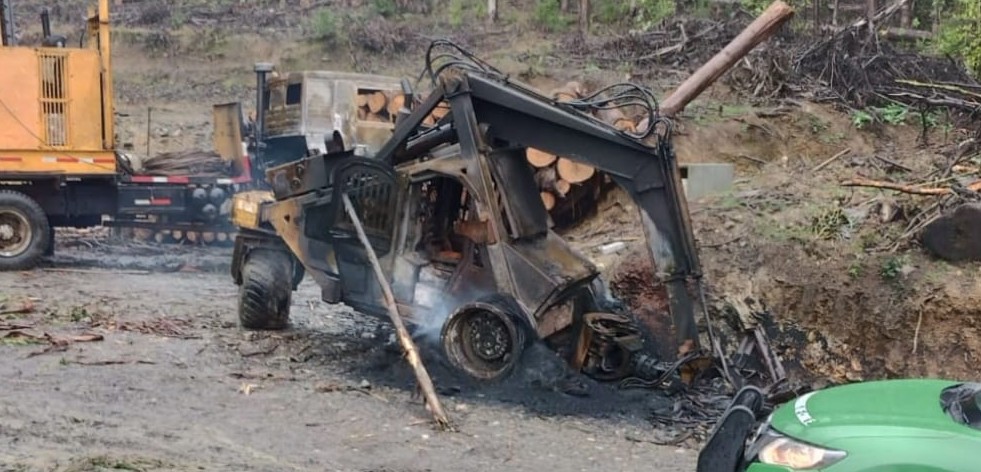Last week was especially violent for the regions of Biobío, La Araucanía, and Los Ríos. Between Monday the 15th and Sunday the 21st, 18 violent incidents were recorded, coinciding with the visit of Undersecretary of the Interior Manuel Monsalve and Defense Minister Maya Fernández to the area.
In Mirada Líbero, we spoke with Martín Haverbeck, owner of the Tumuntuco La Selva estate, located 9 kilometers from the town of Quepe in Freire, La Araucanía. This farming family suffered the burning of 3 houses, 2 warehouses—one containing the potato harvest and the other housing machinery—along with 4 tractors, heavy machinery, 2 trucks, and a car. Nine families dependent on the farm were left adrift.
He adds, "Two workers witnessed this from just a few meters away. Those people tried to take shelter as best they could. They are completely terrified because they didn’t know if their house, with them inside, would be next to burn. So, our workers and we are in shock and very concerned about safety. Carabineros can’t station officers permanently because the resources aren’t available, and unfortunately, our people and the land are unprotected."
"We are angry and dismayed by the situation we’ve had to face," Haverbeck states. The farmer recounts, "In the early hours of this Saturday, around 1 a.m., between 10 and 20 people entered the estate with torches, very coordinated, and burned practically everything we had. Absolutely nothing was left."
Haverbeck warns that the State is absent in the area, stating, "One feels that the State has lost this war because incidents in the region are increasing in both number and severity, and the State can’t keep up. This is a battle already lost, and the ones governing are these terrorist groups who do as they please—no one ends up imprisoned, no arrests, no trials. In the end, those of us who work and provide jobs are left defenseless."
The agricultural entrepreneur confirms they had already received threats and several robberies since November of last year, despite previously having a good relationship with the community. "We had 20 animals stolen, some motorcycles taken, and we also suffered from the fires during the summer—several hectares burned, all intentionally set. Workers who live on the estate received threats at their doors, with two funeral wreaths left for them, telling them to leave because 'these lands are theirs,'" he recounts.
The State of Emergency in the Southern Macrozone has faced heavy criticism in recent months due to escalating violence. On one hand, the governor has stated that a special plan is needed for the area, while Undersecretary Monsalve, who visited last week, said they would review the decree and explore new measures.
For Haverbeck, this measure "doesn’t work, it’s not enough. Maybe it helped at some point, but the numbers show that high-severity incidents, like the one we suffered, have been increasing. There need to be other solutions—more authority for the Armed Forces. It makes no sense for them to be stationed statically without proactive efforts to pursue suspects or gather intelligence. I see it as a band-aid for a massive disease."
Additionally, after meetings with the Presidential Delegation and Governor Rivas, he emphasized that what they need is greater security and police protection. "The priority is safety measures to protect our workers' lives, so they feel secure, and so we can rely on police or military presence to give us peace of mind to keep working. That’s what we want—to work in peace. We need immediate security support," he states.
On the other hand, he admits he would like central government authorities to visit his estate and see what happened, "because we feel the State has failed us. We need someone to show up and say, ‘Here is the State, and we are here to protect Chilean citizens,’ to listen to us and feel the pain and frustration we carry."
Source:www.ellibero.cl







Comments (0)
No comments yet. Be the first to comment!
Leave a comment